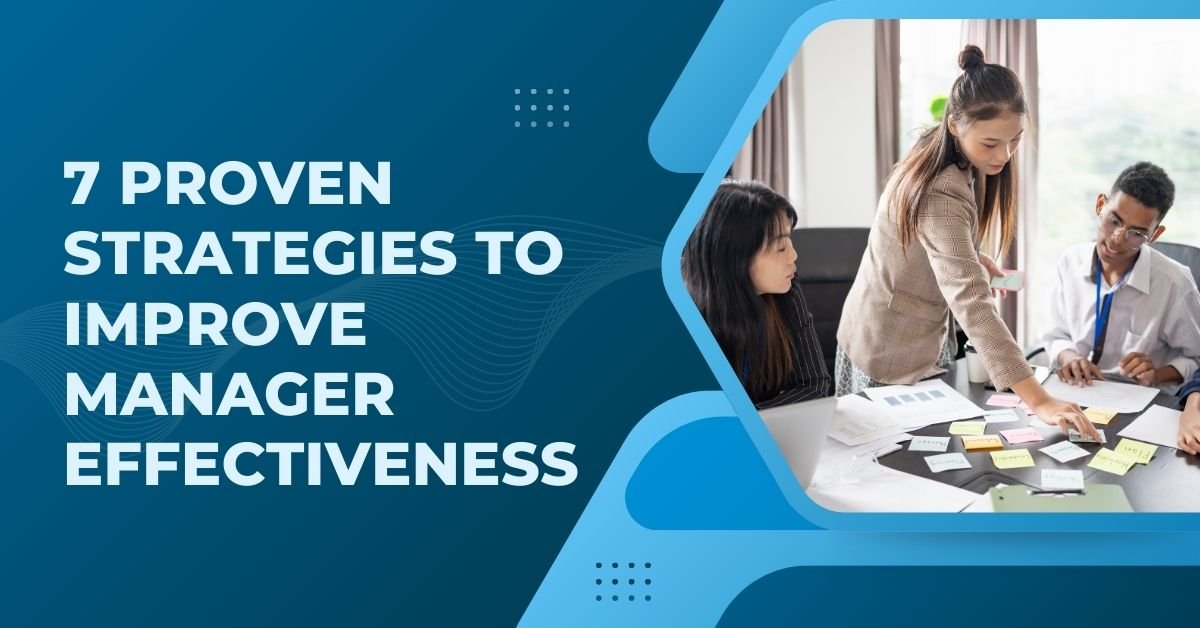Summary: Manager effectiveness plays a vital role in shaping team performance, employee engagement, and organizational success. Effective managers build trust, communicate clearly, resolve conflicts constructively, and motivate teams to perform at their best. By investing in leadership development, fostering a culture of feedback, and equipping leaders with practical tools, organizations can strengthen their management practices. Prioritizing manager effectiveness not only boosts productivity but also creates a thriving workplace culture where employees feel valued and inspired to grow.
Effective managers are the backbone of high-performing teams, yet leading people comes with constant challenges—balancing workloads, resolving conflicts, motivating employees, and guiding teams through change. Improving manager effectiveness requires intentional strategies that enhance leadership skills, communication, and team engagement. By focusing on self-awareness, conflict management, team motivation, and continuous learning, managers can drive productivity, foster collaboration, and create a positive work environment, ensuring both individual and organizational success.
Research shows that managers account for at least 70% of the variance in employee engagement, and companies with highly effective managers are 48% more likely to exceed financial performance expectations. Improving manager effectiveness requires intentional strategies that enhance leadership skills, communication, and team engagement.
Why Is It Important to Improve Manager Effectiveness?
Improving manager effectiveness is critical because managers directly influence team performance, engagement, and overall organizational success. Effective managers ensure that goals are clearly communicated, workloads are balanced, and employees feel motivated and supported. They can resolve conflicts constructively, guide teams through change, and foster a positive workplace culture.
When managers are highly effective, employees are more engaged, productive, and loyal, which reduces turnover and boosts morale. Conversely, ineffective management can lead to miscommunication, frustration, low motivation, and decreased performance. By enhancing managerial skills, organizations build stronger, high-performing teams that can navigate challenges, achieve strategic objectives, and sustain long-term success.
7 Strategies to Improve Manager Effectiveness
Enhance Self-Awareness
Self-awareness is the cornerstone of effective leadership. Managers who understand their own strengths, weaknesses, and natural tendencies are better equipped to make thoughtful decisions, manage stress, and respond constructively to challenges. By recognizing how their behavior affects team dynamics, managers can adjust their approach to foster trust and collaboration. Self-aware leaders can identify blind spots, adapt to different personalities, and build stronger relationships, creating a positive and productive work environment.
Improve Communication Skills
Effective communication goes beyond simply sharing information—it involves clarity, active listening, and adapting messages to suit individual team members. Managers who communicate well reduce misunderstandings, align team efforts, and cultivate a culture of transparency. This includes providing clear instructions, delivering constructive feedback, and keeping the team informed of organizational goals and priorities. Good communication strengthens relationships, inspires confidence, and ensures that everyone understands expectations, which drives better overall performance.
Master Conflict Management
Conflict is inevitable in any workplace, but effective managers approach disagreements constructively rather than avoiding them. This requires identifying the root causes of tension, remaining objective, and guiding discussions toward solutions that benefit the team. Proactive conflict management also involves setting clear expectations, encouraging open dialogue, and fostering mutual respect. Managers who handle conflict well can maintain team cohesion, prevent issues from escalating, and turn disagreements into opportunities for growth and improved collaboration.
Motivate and Engage Your Team
Motivation is highly individual—what inspires one employee may not inspire another. Effective managers understand these differences and align tasks and recognition with individual drivers. Engaged team members are more productive, innovative, and committed to organizational objectives. Managers can boost motivation by providing meaningful feedback, acknowledging accomplishments, supporting professional growth, and creating a positive work environment where employees feel valued and empowered to contribute their best efforts.
Delegate Effectively and Empower Employees
Delegation is about more than distributing tasks—it’s about trust, empowerment, and aligning responsibilities with individual strengths. Effective managers provide clear guidance while allowing employees the autonomy to make decisions and take ownership of their work. Empowered employees are more confident, motivated, and productive, which enhances overall team performance. Good delegation also frees managers to focus on strategic priorities, while helping team members grow their skills and confidence, fostering a culture of accountability and initiative.
Lead Teams Through Change
Change is a constant in modern workplaces, and managers play a critical role in guiding teams through transitions. Effective leaders communicate the reasons behind changes, address concerns, and provide support throughout the process. By setting expectations clearly, listening to feedback, and maintaining morale, managers can reduce resistance and ensure continuity in performance. Leading through change also requires adaptability, empathy, and the ability to inspire confidence, so teams feel secure and motivated even during uncertain times.
Commit to Continuous Learning
Effective managers never stop developing their skills. Continuous learning enables leaders to adapt to evolving workplace demands, improve their decision-making, and better support their teams. This can include attending leadership workshops, seeking regular feedback, observing team dynamics, and staying informed about industry best practices. Managers who commit to ongoing learning not only enhance their own effectiveness but also model a growth mindset for their teams, fostering a culture of curiosity, innovation, and continuous improvement.
What Managers Can Do to Improve Their Effectiveness?
Enhancing manager effectiveness is a strategic priority for organizations that want to build stronger teams, improve engagement, and drive long-term success. Managers are often the link between organizational goals and employee performance, which means their ability to lead directly impacts outcomes. To support them in this critical role, organizations can take several important steps:
Invest in Leadership Development
Providing structured leadership development programs ensures that managers are equipped with the skills needed to address today’s workplace challenges. Training that emphasizes communication, decision-making, and emotional intelligence helps managers lead with clarity and confidence. When development opportunities are ongoing, leaders are better prepared to adapt to change and deliver consistent results.
Foster a Feedback-Driven Culture
A culture that values open communication and feedback empowers managers to continuously improve their leadership approach. Constructive feedback—both from team members and senior leaders—enables managers to identify strengths and address areas for growth. Combined with mentorship and coaching, this environment builds accountability and encourages stronger, trust-based relationships.
Equip Managers with Practical Tools
Beyond training, managers need resources that provide guidance for real-world situations, such as resolving conflicts, motivating employees, and managing change. Tools like Everything DiSC Worksmart offer personalized insights and just-in-time strategies that help leaders apply what they’ve learned in their daily roles. This practical support enables managers to perform more effectively and consistently.
Manager Effectiveness in Driving Growth and Collaboration
Strong managers create strong teams, and strong teams fuel organizational success. When leaders are empowered with the right skills and tools, they inspire trust, boost collaboration, and turn everyday challenges into opportunities for growth. By prioritizing manager effectiveness, organizations don’t just improve performance—they shape a culture where people thrive. The path to long-term success begins with investing in leaders who can bring out the best in their teams.





